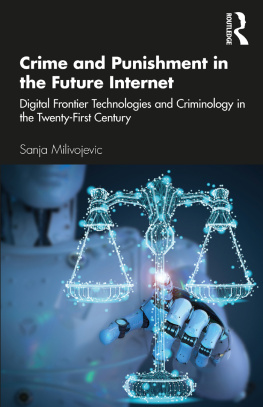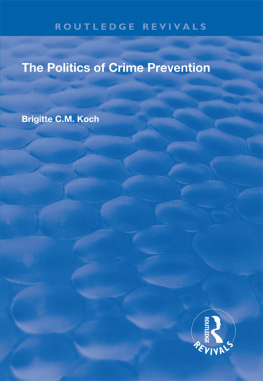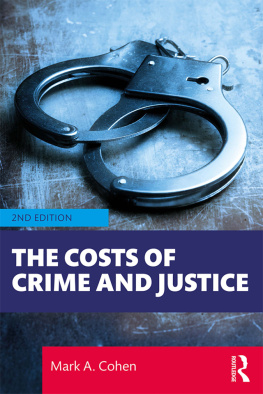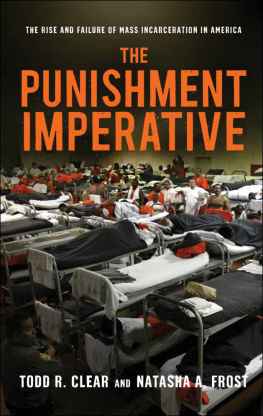Minimizing Harm
Minimizing Harm
A New Crime Policy for Modern America
EDITED BY
Edward L. Rubin
First published 1999 by Westview Press
Published 2018 by Routledge
711 Third Avenue, New York, NY 10017, USA
2 Park Square, Milton Park, Abingdon, Oxon OX14 4RN
Routledge is an imprint of the Taylor & Francis Group, an informa business
Copyright 1999 Taylor & Francis
All rights reserved. No part of this book may be reprinted or reproduced or utilised in any form or by any electronic, mechanical, or other means, now known or hereafter invented, including photocopying and recording, or in any information storage or retrieval system, without permission in writing from the publishers.
Notice:
Product or corporate names may be trademarks or registered trademarks, and are used only for identification and explanation without intent to infringe.
Library of Congress Cataloging-in-Publication Data
Minimizing harm : a new crime policy for modern America / edited by
Edward L. Rubin; contributors, John J. Dilulio Jr [et al.].
p. cm.
Includes bibliographical references.
ISBN 0-8133-3536-1 (hc)
ISBN 0-8133-6804-9 (pb)
1. Crime preventionUnited States. 2. CrimeUnited States Public opinion. 3. Public opinionUnited States. I. Rubin, Edward L., 1948 . II. Dilulio, John J.
HV7431.M56 1999
364.40973dc21
98-27899
CIP
ISBN 13: 978-0-8133-6804-7 (pbk)
Contents
This book has an interesting history, but that history is part of the book itself, and it is recounted in the Introduction.
Ordinarily, one does not think of a books origins as being part of its substance, but that is the result of a somewhat old-fashioned theory of knowledge. It is widely recognized these days that ones conclusions depend, at least in part, upon ones context; this is sometimes called the social construction of reality. In the case of this book, the connection between process and substance is more specific. The book is about social policy; unlike most such books, it does not present optimal policy recommendations, but rather the best policy recommendations that are viable in the particular political context of the present day. To frame such recommendations, the authors not only drew upon their own knowledge and analysis but also placed themselves in the context of elected and appointed officials to whom their recommendations are addressed. They met with these officials, took their advice about the design of the project, met with the crime victims groups that are creating so much of the political climate on this issue, and then presented their conclusions to both groups. That is the reason why the origins and substance of the book are intertwined. The hope is that the recommendations it advances can be used by real-world officials in formulating crime policy in America.
I would like to thank the many people who helped me organize this project. The California Policy Seminar, a program of the University of California, provided the funding; Andres Jimenez and Holly Brown were the seminar administrators who shepherded the original proposal through the process and organized all my meetings with California State officials; Joan Lichterman was the indefatigable editor who prepared the entire manuscript for publication. A number of officials took time from busy schedules to meet with me and the authors of the studies in this book; I particularly want to thank Craig Brown, Greg Harding, Craig Cornett, Elisabeth Kersten, Jim Lewis, Melissa Nappan, and David Panush. Sharon English of the California Office of Prevention and Victims Services provided invaluable help in contacting crime victims groups; I want to thank her and also the many representatives of these groups who overcame their initial doubts about Berkeley to meet with us.
My colleagues were of enormous help to me, as they have been throughout my entire career. Franklin Zimring not only contributed one of the books principal studies but also helped greatly in reviewing my contribution and preparing the entire work for publication. Malcolm Feeley, my coauthor on Judicial Policy Making and the Modern State, also helped me with all aspects of the project. Jerome Skolnick agreed to contribute his study on short notice, after the topic of narcotics was identified as a critical concern by the state officials and crime victims groups. My assistant, Sheila John, was assiduous and infinitely tolerant in transforming thirteen separate contributions into a single manuscript.
Although it is not traditional to acknowledge abstract entities, I also want to thank the University of California. It is truly a great institution, a public university that provides the very best quality education at a price (taking tuition and financial aid into account) that every citizen of California can afford. Perhaps the reason that Californians seem more funloving and present-oriented than other Americansapart from the climateis that they dont need to save large sums of money to provide their children with an absolutely first-rate education. The university also supports world-leading research in every academic field, and this book is the product of that support. Financial and administrative support came from a university-wide program, and intellectual participation and support came from the vast reservoir of talent in my own department, Boalt Hall School of Law. This is primarily a work of social science, not law, but Boalt Hall has a unique, interdisciplinary programJurisprudence and Social Policythat the university established twenty years ago. Zimring, Feeley, and Skolnick are all members of this program, and the latter two would not have been my colleagues without it.
Finally, it is certainly traditional to end by thanking ones family for tolerating the author as he or she struggled to complete the book. I am as intolerable at home as most people are, but I cant attribute my irritability to this book, which has been a pleasure to work on from beginning to end. So, although it is a bit of an aside, I would simply like to thank my familyIlene, Greg, Tim, Juliette, and Alexfor being my family.
Edward L. Rubin
EDWARD L. RUBIN
Thats the effect of living backwards, the Queen said kindly For instance, now, she went on, theres the Kings Messenger. Hes in prison now, being punished: and the trial doesnt even begin till next Wednesday: and of course the crime comes last of all.
Suppose he never commits the crime? said Alice.
That would be all the better, wouldnt it? the Queen said
Alice felt there was no denying that. Of course it would be all the better, she said: but it wouldnt be all the better his being punished.
Youre wrong there, at any rate, said the Queen. Were you ever punished?
Only for faults, said Alice.
And you were all the better for it, I know! the Queen said triumphantly.
Yes, but then I had done the things I was punished for, said Alice: that makes all the difference.
But if you hadnt done them, the Queen said, that would have been better still; better, and better, and better!
Lewis Carroll, Through the Looking Glass
This book represents an effort by a number of leading criminologists to articulate a pragmatic crime policy for Americaa policy that combines academic insights about crime prevention with the realities of contemporary politics. It consists of four principal studies, focusing on public attitudes toward crime, prevention, alternative sanctions, and drug policy, plus two commentaries on each paper. Taken collectively, the studies outline a coherent policy that centers on minimizing harm, as opposed to retribution, eliminating crime, or solving the social problems that generate criminal behavior. The commentaries provide ramifications ofand in some cases, disagreements withthe principal studies. But the general theme is clear: Even in todays politically charged environment, minimizing harm is a pragmatic and effective approach to crime policy in America. Policymakers need not succumb to the naive belief that more prisons and harsher punishments are, as Carrolls White Queen believes, better, and better, and better.









